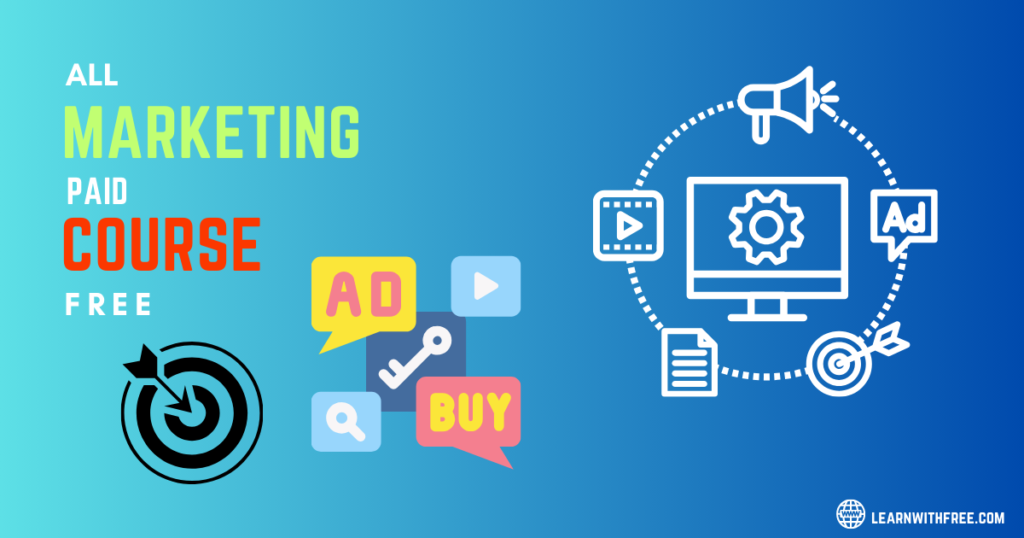Today Blog is All marketing paid course free download how to free download || marketing paid course free download kaise kare ?
Marketing is a set of activities and processes designed to promote, communicate, and sell products or services. It involves understanding customer needs and preferences, creating and delivering value through products or services, and effectively communicating that value to target audiences. The ultimate goal of marketing is to attract, satisfy, and retain customers while achieving the objectives of the organization. marketing paid course free download now free.
Key components of marketing include:
- Market Research: Gathering information about potential customers, competitors, and the overall market to make informed decisions.
- Product Development: Creating and enhancing products or services to meet the needs and preferences of the target market.
- Pricing: Determining the right pricing strategy that aligns with customer expectations, product value, and market conditions. marketing paid course free download how ?
- Promotion: Using various communication channels such as advertising, public relations, social media, and other promotional tactics to raise awareness and persuade potential customers to purchase.
- Distribution (Place): Ensuring that products or services are available in the right locations and through appropriate channels to reach the target audience.
- Branding: Establishing a distinctive brand identity that sets a product or service apart from competitors and builds customer loyalty.
- Sales: Directly engaging with customers to facilitate the purchase of products or services.
- Customer Relationship Management (CRM): Building and maintaining strong relationships with customers to enhance satisfaction, loyalty, and repeat business.
- course : marketing paid course free download now.
Marketing is a dynamic field that continually evolves with changes in consumer behavior, technology, and market trends. marketing paid course free download . It encompasses both traditional and digital marketing strategies, and successful marketing efforts often require a combination of creativity, analytics, and strategic thinking. marketing paid course free download just click.

What is E-commerce ?
E-commerce, short for electronic commerce, refers to the buying and selling of goods and services over the internet. It has grown significantly in recent years, transforming the way businesses operate and consumers shop. E-commerce encompasses various online activities, from online retail stores to online marketplaces and digital transactions.
Key components and characteristics of e-commerce include:
- Online Retail Stores: Businesses set up virtual storefronts where customers can browse and purchase products or services. These stores can range from small, niche shops to large-scale retailers.
- Online Marketplaces: Platforms like Amazon, eBay, and Alibaba connect buyers and sellers, providing a centralized space for a wide range of products and services. Sellers can reach a broader audience, and consumers benefit from a diverse selection.
- Digital Payments: E-commerce relies on electronic transactions, often facilitated through various payment methods such as credit cards, digital wallets, and other online payment systems. Security and ease of payment are crucial aspects of a successful e-commerce platform.
- Mobile Commerce (M-commerce): With the widespread use of smartphones and tablets, many e-commerce transactions occur through mobile devices. Mobile apps and optimized websites provide a seamless shopping experience for on-the-go consumers.
- Supply Chain and Logistics: Efficient supply chain management is critical in e-commerce to ensure timely delivery. Warehousing, order fulfillment, and shipping logistics play a vital role in meeting customer expectations for quick and reliable deliveries.
- Data Security: Given the sensitive nature of online transactions, e-commerce platforms must prioritize cybersecurity. Implementing secure payment gateways, encryption, and other measures help protect customer information and build trust.
- Personalization and Recommendation Engines: E-commerce platforms often use data analytics to understand customer preferences and behavior. This information is used to personalize the shopping experience, provide targeted recommendations, and enhance customer satisfaction.
- Global Reach: E-commerce transcends geographical boundaries, allowing businesses to reach a global audience. This global reach presents opportunities for expansion but also requires an understanding of diverse markets, cultures, and regulations.
- Customer Reviews and Ratings: Online reviews and ratings play a significant role in influencing purchase decisions. Positive reviews can build trust, while negative ones can impact a brand’s reputation. E-commerce businesses often encourage customer feedback to improve their products and services.
- E-commerce Marketing: Digital marketing strategies, including search engine optimization (SEO), social media marketing, and email campaigns, are crucial for driving traffic to e-commerce websites and attracting potential customers.
E-commerce continues to evolve, with advancements such as augmented reality (AR), virtual reality (VR) shopping experiences, and blockchain technology contributing to its ongoing transformation. As consumer preferences shift and technology advances, the e-commerce landscape is likely to see further innovation and growth.
What is Facebook ads ?
Facebook Ads refers to the advertising platform provided by Facebook, the popular social media platform. It allows businesses and individuals to create and run targeted ads to reach specific audiences on the Facebook platform and its associated apps, such as Instagram. Facebook Ads provide a powerful tool for businesses to promote their products, services, events, and more to a vast and diverse user base.
Key components and features of Facebook Ads include:
- Ad Creation: Users can create different types of ads, including image ads, video ads, carousel ads, slideshow ads, and more. The ad creation process involves choosing the ad format, adding creative elements (images or videos), and crafting compelling ad copy.
- Course Free : marketing paid course free download.
- Targeting: Facebook Ads enable highly targeted advertising. Advertisers can define their target audience based on factors such as demographics, interests, behaviors, location, and more. This precision allows businesses to tailor their ads to specific groups of users who are more likely to be interested in their offerings.
- Ad Placement: Facebook Ads can appear in various locations, including the Facebook News Feed, Instagram feed, Stories, and in the right column on desktop. Advertisers can choose where they want their ads to be displayed to maximize visibility and engagement.
- Budget and Bidding: Advertisers set a budget for their campaigns, specifying the maximum amount they are willing to spend. They can also choose a bidding strategy, determining how they want to pay for ad delivery (e.g., cost per click, cost per impression).
- Ad Analytics and Insights: Facebook provides detailed analytics and insights into ad performance. Advertisers can track metrics such as reach, engagement, clicks, conversions, and more. These insights help in evaluating the effectiveness of campaigns and making data-driven decisions.
- Custom Audiences: Advertisers can create custom audiences by uploading customer lists, engaging with website visitors, or targeting users who have interacted with their app. This allows for more personalized and targeted advertising.
- Lookalike Audiences: Facebook Ads also offer the ability to create lookalike audiences, which are new audiences that share similar characteristics with an advertiser’s existing customer base. This helps businesses expand their reach to potential customers who are likely to be interested in their products or services.
- Ad Formats for Different Objectives: Facebook Ads cater to various marketing objectives, including brand awareness, engagement, traffic, app installs, lead generation, and conversions. Different ad formats and targeting options are available based on the specific goal of the campaign. marketing paid course free download.

Facebook Ads provide a flexible and robust platform for advertisers to connect with their target audience, increase brand visibility, and drive desired actions such as website visits or product purchases. The platform’s extensive user base and detailed targeting options make it a valuable tool for businesses looking to reach and engage with a specific audience on social media.
♻️Share And Support us♻️
Course Teacher : – marketing paid course free download
Course Language : Hindi & English
Course Size : 100GB +
Course : marketing paid course free download
marketing paid course free download Click For Download :

marketing paid course free download Telegram Group :

